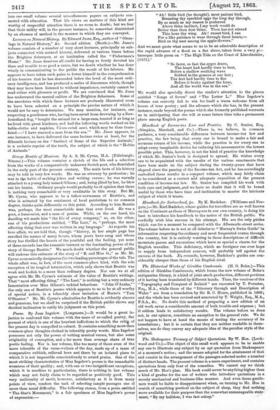Poems. By Jean Ingelow. (Longmans.)—It would be a great in-
justice to confound this volume with the mass of so-called poetry, the perusal of which is one of the heaviest inflictions to which the critii of the present day is compelled to submit. It contains something more than common-place thoughts clothed in tolerably pretty words. Miss Ingelow possesses not only the power of writing musical verses, but also some originality of conception, and a far more than average share of true poetic feeling. Nor is her volume, like too many of those even of the more tolerable of the verse-writers of the day, made up of a mass of comparative rubbish, relieved here and there by an isolated piece to which it is not impossible conscientiously to award praise. One of the most striking characteristics of Miss Ingelow's poems is the remarkable evenness of their quality; and, with one or two insignificant exceptions, which it is needless to particularize, there is nothing in her volume which may not fairly claim to be regarded as positively good. This very uniformity of merit, however, satisfactory as it is from many points of view, renders the task of selecting sample passages one of more than usual difficulty. The following stanza, from a poem entitled "The Star's Monument," is a fair specimen of Miss Ingelow's power of expression:— "Ah! little bird (he thought), most patient bird,
Breasting thy speckled eggs the long day through, By so much as my reason is preferred Above thine instinct, I my work would do Better than thou dost thine. Thou has not stirred This hour thy wing. Ah ! russet bird, I sue
For a like patience to wear through these hours,—
Bird on thy nest among the apple-flowers."
And we must quote what seems to us to be an admirable deseription of the rapid advance of a flood on a flat shore, taken from a very pic- turesque little poem on "The High Tide on the Coast of Lincolnshire, (1571)." "So farre, so fast the eygre drave, The heart had hardly time to beat, Before a shallow seething wave Sobbed in the grasses at our feet ; The feet had hardly time to flee Before it brake against the knee, And all the world was in the sea."
We would also specially direct the reader's attention to the pieces entitled "Songs of Seven" and "The Letter L." Miss Ingelow's volume can scarcely fail to win for itself a warm welcome from all lovers of true poetry ; and the advance which she has, in the present instance, made beyond the poems which she formerly published warrants us in anticipating that she will at some future time take a permanent place among English poets.






























 Previous page
Previous page